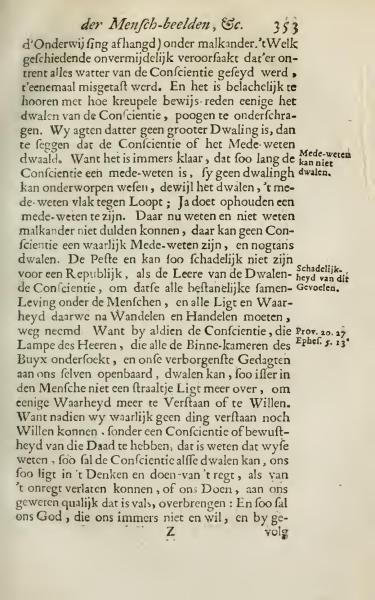The Depiction of Humans, etc.
The conduct among each other depends on teaching. It inevitably causes that everything said about the Conscience was completely misconstrued. It is absurd to hear how weak arguments are used to bolster some deviation from Conscience. We consider it the greatest error to say that the Conscience or knowing has gone astray. For it is clear that as long as Conscience is knowing, it cannot be subject to deviation because deviation directly opposes knowing; indeed, it ceases to be knowing. Where knowing and not knowing cannot tolerate each other, there can be no Conscience true knowing, yet there is still deviation. The Plague can scarcely be as harmful to a Republic as the teachings of Deviating Conscience, which eradicates all harmonious coexistence among people, and removes all Light and Truth necessary for Walking and Acting. For if Conscience, which is the Lord's lamp that searches all the inner chambers of the Belly and reveals our most hidden Thoughts to ourselves, can deviate, then not a ray of Light remains in Man to understand any Truth or Will. For without Conscience or awareness of the deed, which is knowing that we know, Conscience can thus deviate, and lead us as far from Right as from Wrong to convey our actions falsely and harm our conscience. And so God, who never wishes ill upon us, and lastly, by...
Translation Notes:
1. "d'Onderwijƒing" is interpreted as "the conduct among each other depends on teaching."
2. "Conƒcientie" is translated as "Conscience," referring to one's inner sense of right and wrong.
The text discusses the concept of conscience, emphasizing that conscience, as true knowing, cannot deviate. It warns against the errors and potential harm of deviating conscience, describing it as comparable to a plague for society. The argument is that conscience is essential for understanding truth and moral action, acting as an inner guiding light.
